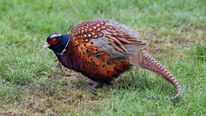Simbo
Well-known member
- Joined
- Sep 8, 2013
- Messages
- 651
Bird flu detected in 10,000 pheasants at farm in Preston
Defra says all surviving pheasants are going to be culled, with Public Health England stressing the risk to humans is "very low".
07:57, UK,Wednesday 25 January 2017

Image Caption: Defra has launched an investigation into the source of the infection
The H5N8 strain of the disease was confirmed by the UK's chief veterinary officer.
An unconfirmed number of breeding pheasants at the site in Preston have already died, and the rest are going to be culled.
Public Health England has stressed that the risk to public health from the outbreak is "very low".
However, a 1.8 mile (3km) protection zone and a 6.2 mile (10km) surveillance zone has been enforced around the infected area to try to prevent the disease spreading.
:: France orders cull of ducks after severe bird flu outbreak
The Food Standards Agency added the case does not pose a food safety risk for British consumers.
A full investigation has begun to determine the source of the infection.
On 16 January, Defra confirmed a case of avian flu in a flock of approximately 6,000 turkeys at a farm in East Lindsey, Lincolnshire.
And at the start of the month, the strain was also detected in two small backyard flocks of chickens and ducks at a property near Settle in North Yorkshire, and in Carmarthenshire in southwest Wales.
An avian influenza prevention zone, which requires owners to keep poultry and captive birds indoors - or take measures to keep them separated from wild birds - remains in place until 28 February.
Defra says all surviving pheasants are going to be culled, with Public Health England stressing the risk to humans is "very low".
07:57, UK,Wednesday 25 January 2017

Image Caption: Defra has launched an investigation into the source of the infection
Bird flu has been discovered in a "flock" of about 10,000 pheasants at a farm in Lancashire, the Department for Environment, Food and Rural Affairs (Defra) has said.
The H5N8 strain of the disease was confirmed by the UK's chief veterinary officer.
An unconfirmed number of breeding pheasants at the site in Preston have already died, and the rest are going to be culled.
Public Health England has stressed that the risk to public health from the outbreak is "very low".
However, a 1.8 mile (3km) protection zone and a 6.2 mile (10km) surveillance zone has been enforced around the infected area to try to prevent the disease spreading.
:: France orders cull of ducks after severe bird flu outbreak
The Food Standards Agency added the case does not pose a food safety risk for British consumers.
A full investigation has begun to determine the source of the infection.
On 16 January, Defra confirmed a case of avian flu in a flock of approximately 6,000 turkeys at a farm in East Lindsey, Lincolnshire.
And at the start of the month, the strain was also detected in two small backyard flocks of chickens and ducks at a property near Settle in North Yorkshire, and in Carmarthenshire in southwest Wales.
An avian influenza prevention zone, which requires owners to keep poultry and captive birds indoors - or take measures to keep them separated from wild birds - remains in place until 28 February.










































